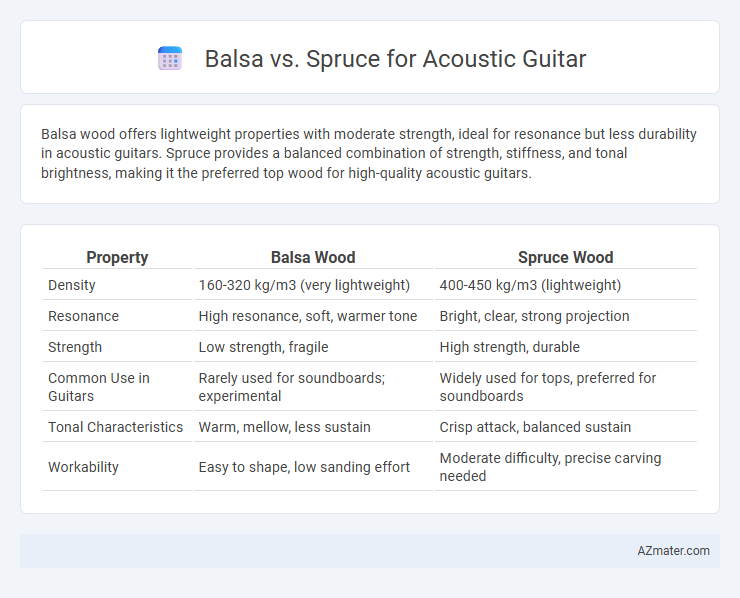Balsa wood offers lightweight properties with moderate strength, ideal for resonance but less durability in acoustic guitars. Spruce provides a balanced combination of strength, stiffness, and tonal brightness, making it the preferred top wood for high-quality acoustic guitars.
Table of Comparison
| Property | Balsa Wood | Spruce Wood |
|---|---|---|
| Density | 160-320 kg/m3 (very lightweight) | 400-450 kg/m3 (lightweight) |
| Resonance | High resonance, soft, warmer tone | Bright, clear, strong projection |
| Strength | Low strength, fragile | High strength, durable |
| Common Use in Guitars | Rarely used for soundboards; experimental | Widely used for tops, preferred for soundboards |
| Tonal Characteristics | Warm, mellow, less sustain | Crisp attack, balanced sustain |
| Workability | Easy to shape, low sanding effort | Moderate difficulty, precise carving needed |
Introduction to Acoustic Guitar Tonewoods
Balsa and spruce are two prominent tonewoods used in acoustic guitar construction, each influencing the instrument's sound and playability. Spruce, especially Sitka spruce, is renowned for its strength-to-weight ratio, delivering a bright, clear, and dynamic tonal response favored by many guitarists. Balsa, being significantly lighter and softer, produces a warm, mellow sound with less sustain and projection, often utilized in small-sized or experimental guitars where ultra-lightweight is essential.
Understanding Balsa Wood Characteristics
Balsa wood is known for its exceptionally light weight and low density, making it one of the softest and most porous woods used in acoustic guitar construction. Its porous structure enhances resonance and sustain, contributing to a warm, mellow tone that differs from the brighter, more defined sound of spruce. Despite its softness, balsa requires careful reinforcement to maintain structural integrity in guitars compared to the more robust and stiff spruce.
Spruce: The Industry Standard for Acoustic Tops
Spruce remains the industry standard for acoustic guitar tops due to its ideal balance of strength, lightweight properties, and resonance, offering clear, bright tones with excellent projection. Its fine grain and stiffness allow for superior responsiveness and dynamic range, making it a favorite among both beginners and professional luthiers. Compared to balsa, spruce provides greater durability and tonal stability, ensuring consistent sound quality over time.
Weight and Density Comparison: Balsa vs Spruce
Balsa wood is significantly lighter than spruce, with a density typically around 160 kg/m3 compared to spruce's range of 350-450 kg/m3, making balsa nearly half the weight of spruce. This weight difference impacts the acoustic guitar's overall mass, where balsa offers a lighter instrument but with less structural strength and potentially reduced tonal projection. Spruce's higher density provides greater stiffness and resonance, resulting in a more powerful and balanced sound ideal for acoustic guitar tops.
Tonal Qualities: How Balsa and Spruce Sound
Balsa wood produces a warm, mellow tone with softer midrange frequencies, making it ideal for those seeking a smooth, intimate sound from their acoustic guitar. Spruce, particularly Sitka spruce, is renowned for its bright, clear, and articulate tonal qualities, offering strong projection, well-defined highs, and a balanced dynamic range. The choice between balsa and spruce directly impacts the guitar's resonance and tonal complexity, with balsa favoring a more subdued sound and spruce delivering vibrant, crisp notes.
Structural Strength and Durability
Spruce is renowned for its superior structural strength and long-lasting durability in acoustic guitar construction, providing excellent support for tension from steel strings and resistance to environmental changes. Balsa, while exceptionally lightweight, lacks the density and rigidity required for withstanding string tension over time, making it less durable and more prone to damage. Therefore, spruce remains the preferred choice for robust, reliable acoustic guitar tops that endure consistent play and varying humidity levels.
Workability and Luthier Preferences
Balsa wood offers exceptional workability due to its lightweight and soft texture, allowing luthiers to shape and carve intricate details with ease, which is advantageous for experimental or custom acoustic guitar designs. In contrast, spruce, particularly Sitka or Engelmann varieties, is a traditional choice favored by luthiers for its fine grain and consistent density, providing a reliable balance of strength and responsiveness crucial for soundboard construction. While balsa's softness may limit durability and tonal projection, spruce's tighter fibers and stability often result in preferred acoustic properties and long-term structural integrity in guitar building.
Cost and Availability Considerations
Balsa wood, known for its lightweight and softness, is significantly less expensive than spruce, making it a cost-effective choice for budget acoustic guitars. Spruce offers a proven balance of durability and tonal quality, commonly available worldwide, while balsa is rare in guitar manufacturing and may be harder to source in large quantities. Manufacturers often choose spruce for its widespread availability and consistent performance, despite the higher cost compared to balsa alternatives.
Suitability for Different Guitar Body Types
Balsa wood is highly suitable for lightweight, thin-bodied acoustic guitars due to its exceptional lightness and resonance, enhancing sound volume and brightness in smaller or travel-sized models. Spruce, especially Sitka or Engelmann varieties, is preferred for traditional dreadnought or jumbo body types because of its strength and stiffness, providing a balanced tone with clarity and dynamic range. Both woods influence guitar resonance and projection differently, making balsa ideal for portability without sacrificing tone, while spruce supports robust sound suitable for full-sized acoustic guitars.
Conclusion: Choosing Between Balsa and Spruce
Spruce offers superior strength-to-weight ratio and excellent resonance, making it the preferred choice for traditional acoustic guitars seeking bright, clear tones. Balsa, while extremely lightweight and resonant, is softer and less durable, suited for experimental or unique sound profiles rather than standard performance. Selecting between balsa and spruce depends on balancing tonal preference, durability, and intended guitar use.

Infographic: Balsa vs Spruce for Acoustic Guitar
 azmater.com
azmater.com